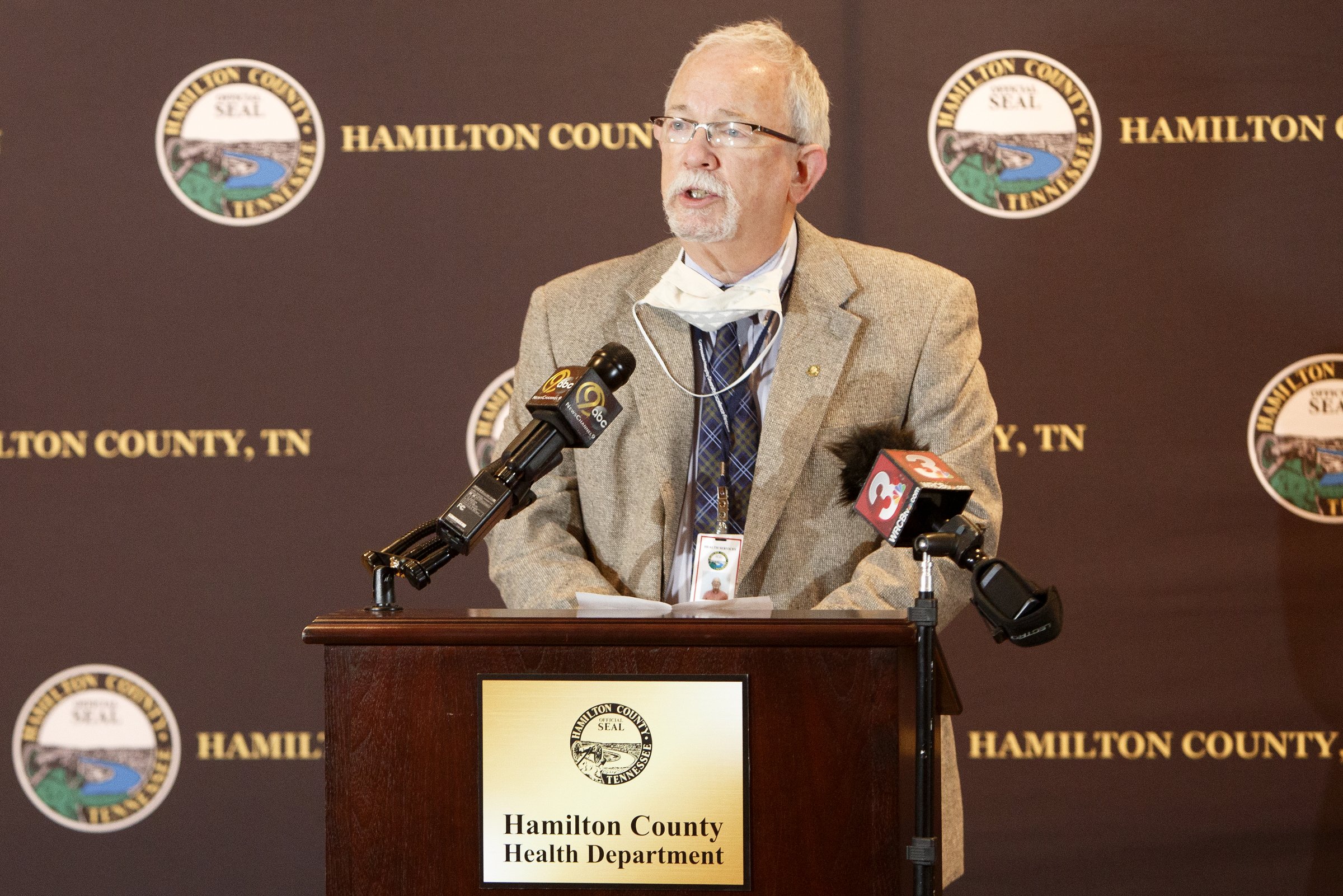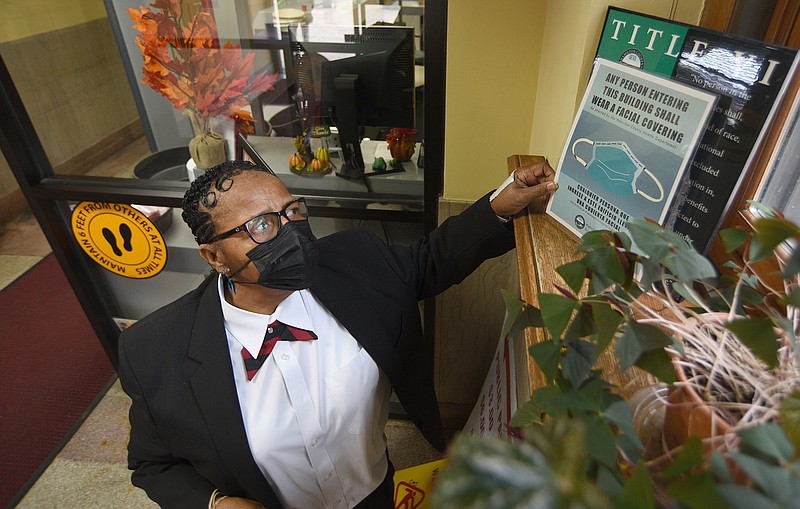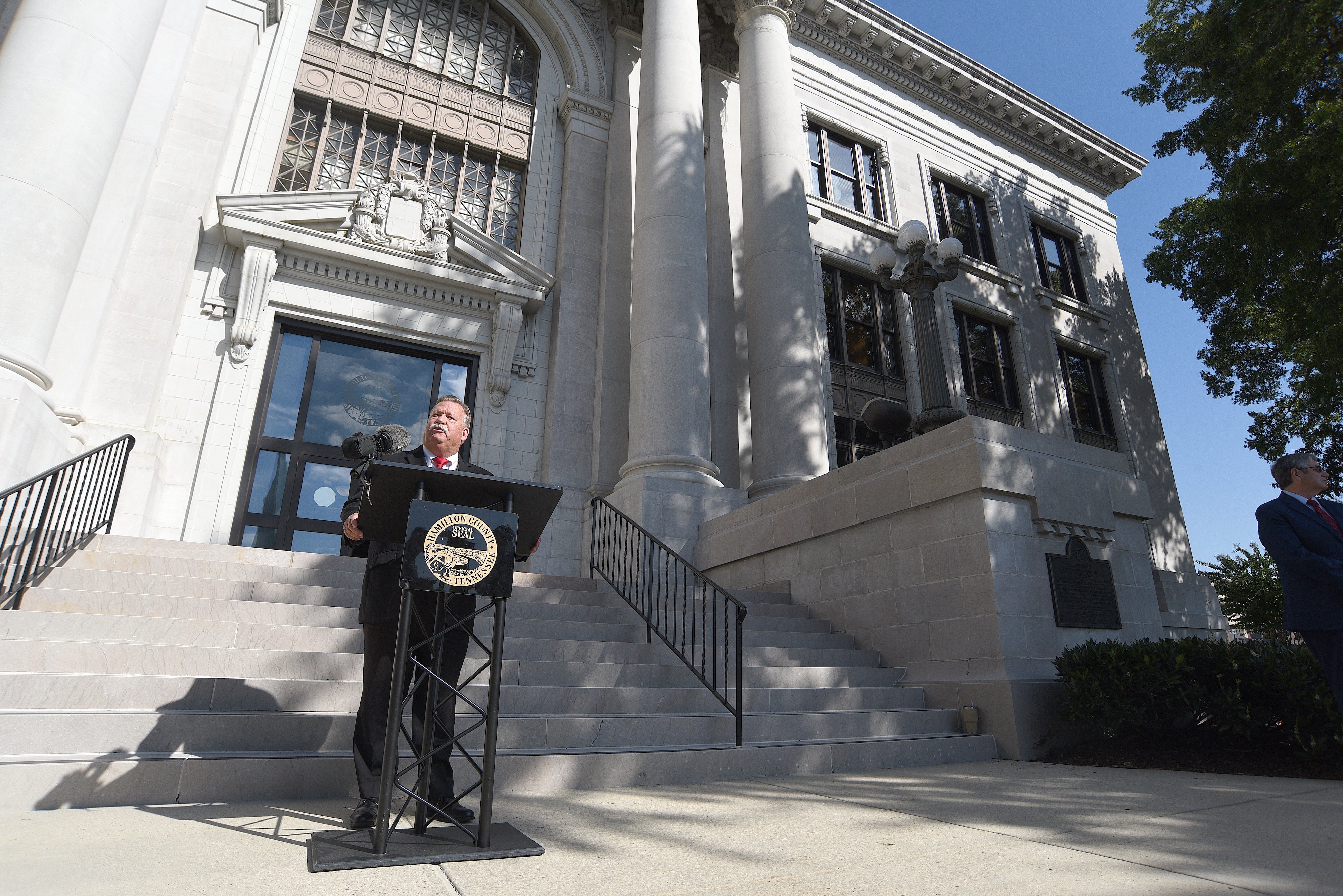Measures passed in Nashville late last month during a special legislative session would revoke many of Hamilton County's rights to make its own decisions about how to respond to the COVID-19 pandemic
The bills await action by Gov. Bill Lee, but should they become law they will mean the county cannot determine when or for how long to implement a mask mandate. Authority to quarantine a person or business in response to COVID-19 would shift to the state.
The choice by state legislators, including nearly all members of Hamilton County's delegation, to move key decision-making powers from counties with independent health departments to Nashville angered some local officials, including Hamilton County Mayor Jim Coppinger.
"It was a little disappointing to me to see the state want to take that authority away from local governments," Coppinger said. "We'll obviously comply with what we have to but, again, the people closest to the people should be making those decisions, in my opinion."
State and local health departments across the country have become the target of state legislatures looking to rein in their authority to implement longstanding public health practices brought to the forefront by the COVID-19 pandemic.
Many of these measures - such as the ability to impose quarantines and mandate other actions - date back to colonial times, where they were regularly employed to curb infectious disease outbreaks ranging from smallpox to yellow fever.
A 2021 report from the National Association of County and City Health Officials says it makes sense that a pandemic would prompt state legislators to revisit laws governing emergency powers and public health authority.
"The most helpful process would include a comprehensive and nonpartisan assessment of the response, with after-action reports and input from public health and executive branch officials who are no longer fully engaged in response efforts," the report states.
However, in many cases - including in Tennessee's rushed special session - that has not been the case.
The report states that legislation blocking reasonable, evidence-based public health measures such as mask wearing and social distancing or that strip authority from trained, local public health professionals who know their communities puts lives at risk not only during the COVID-19 pandemic but for unforeseen future threats.
"These proposed and enacted laws would add a level of bureaucracy and politics that undercut the flexibility and timeliness of local public health orders and make it harder for public health experts on the front lines to protect and respond," it said.
To mandate face masks going forward, the new Tennessee law would require the governor to declare a state of emergency and counties to report at least 1,000 new COVID-19 cases per 100,000 residents over 14 days, according to a copy of the bill. If these conditions are met and a mask mandate is implemented, the mandate cannot last longer than 14 days. However, mandates can be renewed if the requirements are still being met.
The other measure would bar the commissioner of health, local health departments, county mayors or other officials from contradicting or refusing to comply with executive orders from the governor about the pandemic.
Previously, the county health departments in 89 of Tennessee's 95 counties were controlled by the state department of health, while six more populous counties - Madison, Shelby, Knox, Davidson, Hamilton and Sullivan counties - operated under local controls.
Dr. Paul Hendricks, a former emergency medicine physician who retired from the Hamilton County Health Department's top medical position in February, compared being forced to meet such a high case rate threshold before initiating a mask mandate to watching a trauma patient bleed out.
"And they say, 'Well, let's wait until he bleeds a few more quarts, and then we'll stop the bleeding,'" Hendricks said. "It's just ridiculous. I don't know where they got their information, where they got these numbers. They said they consulted with some people, and I have no idea who they consulted with. Obviously, no one called me."
Coppinger, who announced in October he will not seek re-election at the end of his term in 2022, also said he was troubled that state legislators did not seek his input when crafting the measures under which Hamilton County now must comply.
"I did not get one single phone call to ask me what my opinion was. Or anybody, our health department didn't. Nobody. Nobody asked the people on the ground that are dealing with this what we thought," he said. "They call a special session. They do what they choose to do. It doesn't mean they have to, but from where I sit, I mean, I always, whoever is going to be impacted, I call and say, 'How's this going to impact you?'"
Caught in the middle
Throughout the pandemic, Lee resisted calls for a statewide mask mandate, saying it should be a decision for local county mayors.
"Statewide, one-size-fits-all mandates are not as effective in many cases as local decision making," Lee said in October 2020.
While most of Hamilton County's legislative delegation that voted in favor of the recent bills praised Hamilton County's handling of the pandemic, they said they disagreed with pandemic responses in other municipalities that had local control, specifically in urban areas like Nashville, Memphis and Knoxville.
Coppinger, a Republican, implemented a countywide mask mandate on July 10, 2020, and kept the measure in place until April 28, 2021.
Sen. Todd Gardenhire, R-Chattanooga, who voted in favor of last month's measures, said his vote was "absolutely no reflection on Hamilton County's response."
"Hamilton County wasn't the problem," Gardenhire said. "The problem was Shelby County, Davidson County and Knox County."
Conservative lawmakers were at odds with Tennessee's major metropolitan counties throughout the pandemic, including with their decisions to implement mask mandates in schools and limit gatherings.
State Rep. Robin Smith, R-Hixson, a member of the health committee, said her votes in favor of the bills should not be interpreted as being against decisions made in Hamilton County. Smith said there were too many differences across the state in response to the pandemic, so it made sense to create a set of guidelines.
"In this case, if we can have Mayor Jim Coppingers across the state, and have the relationship that was really ideal between the local health department and our county mayor, that was the benchmark," Smith said. "Because there are 95 different counties and even more municipalities and school systems embedded within them, it was difficult to explain to them why some children were being withheld from being in school and others weren't."
Peter Jones, an assistant professor in the Department of Political Science and Public Administration at the University of Alabama at Birmingham, said that when states don't like what a locality is doing, they are increasingly using a legislative and judicial tool called preemption - which occurs when a higher level of government eliminates or reduces the authority of a lower level over a given issue.
Historically, most state pre-emption occurred when either a local ordinance conflicted with a state law on a specific matter or when the state would preempt a local action and replace it with a statewide law, Jones said in an email.
"But now we're seeing state legislatures pass laws that are fairly narrow in scope, are often partisan and do not replace the local law with a statewide regulatory framework," he said.
Jones said the best policy approaches usually include thoughtful, statewide structure that allows for local flexibility. He used the example of K-12 education, where the state sets the structure through curriculum and funding, but local school districts have autonomy to manage resources and meet student needs.
While the same framework could be applied to public health, Jones said there's the added challenge that viruses don't pay attention to city or county lines. For that reason, local communities can benefit from a statewide approach that sets certain public health standards, he said.
"But that is not what has happened in Tennessee and other states," Jones said. "The state has blocked city and county attempts to address the pandemic without replacing it with a statewide framework. From a public health standpoint, this isn't a great outcome, and even politically, it likely puts pressure on local officials and energizes constituents in cities that have been preempted."
Jones said this strategy could backfire for the GOP-controlled General Assembly both in the short term - as the federal government increases its own response to these state preemptions - and down the road. Since the preemption trend is unlikely to slow down anytime soon, he said the precedent is now set should Tennessee become controlled by Democrats in the future.
"Comparatively smaller, rural localities will have less ability to fight state preemption than major metros," Jones said. "Fans of local autonomy (i.e., home rule) folks who live in smaller cities should be really concerned about what the legislature is doing now because they will have very little recourse if and when the state preempts something they want."
'A two way street'
Throughout the pandemic, Coppinger consulted with two pandemic task forces composed of local leaders in the health and medical communities, as well as experts in other fields. One task force included Chattanooga's then-mayor, Andy Berke, a Democrat.
While the mask mandate was in place, Coppinger was in regular contact with local hospitals and physicians about his decisions to renew the order, he said.
"It wasn't done in a bubble. It wasn't me sitting in an office reading literature and making decisions. We were talking to real people and meeting, coming up with solutions. And that's why I think it should always be a local decision. You're getting local input," Coppinger said. "You won't have that if everything's being made in Nashville or being made in D.C."
After the county and state rolled back initial COVID-19 restrictions in May 2020, cases and hospitalizations began rising throughout June. Shelby, Davidson and Knox counties all instituted face mask requirements. Pressure was mounting for Hamilton County to do the same.
 Staff photo by C.B. Schmelter / Hamilton County Health Officer Dr. Paul Hendricks speaks during a press conference at the Hamilton County Health Department's Golley Auditorium on Monday, July 6, 2020 in Chattanooga, Tenn. Mayor Jim Coppinger said that people in Hamilton County will be required to wear a mask or face covering in public starting after midnight on July 10.
Staff photo by C.B. Schmelter / Hamilton County Health Officer Dr. Paul Hendricks speaks during a press conference at the Hamilton County Health Department's Golley Auditorium on Monday, July 6, 2020 in Chattanooga, Tenn. Mayor Jim Coppinger said that people in Hamilton County will be required to wear a mask or face covering in public starting after midnight on July 10.Although Hendricks said he would have preferred to go ahead and require face coverings in public, Coppinger wanted to give people a chance to adopt widespread masking on their own.
"We tried for a few weeks, but people didn't seem to be responding well. We kept seeing our numbers go up and up, and finally, in July, he called us in and said, 'It's time to pull the trigger and do this,'" Hendricks said.
Even with the mandate, compliance was still difficult. Neither the Chattanooga police nor Hamilton County Sheriff's deputies would enforce the mandate, though Hendricks said most employers came around to the idea after the health department worked to educate them about how the masks would help keep their workers healthy, customers safe and businesses open.
He said he can't imagine local health officials navigating such a contentious situation without Coppinger's support.
"For that, I was very fortunate, and I think Hamilton County was very fortunate, because we put that mask mandate into effect the week after Fourth of July, and by the end of the month our cases were coming down," Hendricks said. "I'm convinced that we did a lot of good with that and helped blunt the surge."
In Hendricks' view, one of the biggest issues with the nation's pandemic response is politicians who don't understand science ignoring and fighting with health and medical experts.
"Without good cooperation between the political and the scientific people, things are not going to go well for public health," he said. "If the politicians don't listen to the scientists and the experts, and they let the mob lead them - well, they're no good. And on the other hand, obviously, public health officials have got to work with and have the support of the politicians, so it's a two-way street."
Contact Elizabeth Fite at efite@timesfreepress.com or follow her on Twitter @ecfite.
Contact Wyatt Massey at wmassey@timesfreepress.com or 423-757-6249. Follow him on Twitter @news4mass.
Staff writer Andy Sher contributed to this story.

